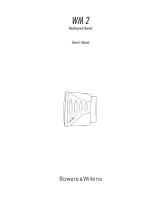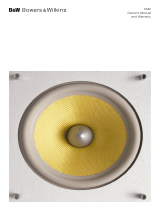
Always screw the terminal caps down
tightly to optimise the connection and
prevent rattles.
Ask your dealer for advice when choosing
cable. Keep the total impedance below the
maximum recommended in the
specification and use a low inductance
cable to avoid attenuation of the highest
frequencies.
Fine tuning
If the sound is too harsh, increase the
amount of soft furnishing in the room (for
example use heavier curtains), or reduce it
if the sound is dull and lifeless.
Test for flutter echoes by clapping your
hands and listening for rapid repetitions.
Reduce them by the use of irregular
shaped surfaces such as bookshelves and
large pieces of furniture.
Mounting the speaker
To the wall
Use the wall plate supplied if you do not
need to angle the speaker. (figure 8)
At each end of the terminal tray at the back
of the speaker is a dovetail feature that
slides into the wall plate.
Use the template provided to mark the
position of the fixing screws for the wall
plate. The overall height and width of the
template correspond to the size of the
speaker and both the vertical and
horizontal centre lines are marked. This
allows you to align the speakers with the
television screen and any other objects.
Pierce through the screw position marks in
the template to leave an indent in the wall.
Hold the wall plate against the wall, aligned
with the screw marks and trace round the
inside of the oval hole, which is used for
cable entry.
With solid walls, chase out a channel for
the speaker cable, ending where you have
marked the oval hole. In cavity walls, simply
drill through the plasterboard and feed the
cable through into the cavity.
Screw the wall plate to the wall using a
spirit level to accurately set it square. Small
angular deviations may not be noticeable to
the eye when looking at the small plate, but
become more obvious with the speaker
itself.
Connect the cable before sliding the
speaker onto the wall plate.
If you need to angle the speakers, two
threaded inserts are provided to allow the
use of an auxiliary mounting bracket. We
recommend the OmniMount
®
type 10.0
wall or ceiling for the FPM4 and FPM5 and
type 20.0 wall or ceiling for the FPM6.
These allow sideways angling and a
downward tilt of up to 10º when the
bracket is mounted above the terminals
and the bottom of the speaker touches the
wall. For the FPM2, the Omnimount
®
type
10.0 wall or ceiling allows extensive
adjustment of angle. Follow the instructions
provided with the bracket and fix the
mounting plate to the back of the speaker
using the two M6 screws provided with the
speaker. (figure 9)
Ensure, especially when fixing to drywall
panels, that the screw length and wall plug
security are sufficient to hold the weight of
the speaker. B&W can accept no liability for
any failure of wall or ceiling fixings.
On a shelf or table
(FPM2 only)
A rear support leg is provided to enable the
speaker to stand upright on a flat surface.
With the strengthening rib pointing away
from the enclosure, attach the leg to the
two threaded inserts in the back of the
speaker, using the screws provided.
Stick the two clear rubber pads to the
underside of the grille frame. (figure 10)
To the optional table stand or floor
stand
Mounting instructions are provided with the
stands. The table stand allows the speaker
to be mounted in either vertical or
horizontal orientation. The floor stand
allows only vertical orientation.
The FPM2 is not suitable for fixing to either
the table stand or the floor stand.
Running-in period
The performance of the speaker will change
subtly during the initial listening period. If
the speaker has been stored in a cold
environment, the damping compounds and
suspension materials of the drive units will
take some time to recover their correct
mechanical properties. The drive unit
suspensions will also loosen up during the
first hours of use. The time taken for the
speaker to achieve its intended
performance will vary depending on
previous storage conditions and how it is
used. As a guide, allow up to a week for
the temperature effects to stabilise and
15 hours of average use for the mechanical
parts to attain their intended design
characteristics.
Aftercare
The cabinets normally only require dusting.
If you wish to use an aerosol cleaner,
remove the grille first by gently pulling it
away from the cabinet. Spray onto the
cleaning cloth, not directly the cabinet.
With the grille detached from the cabinet,
clean the fabric with a normal clothes brush
or vacuum cleaner with appropriate
accessory.
Avoid touching the drive units, especially
the tweeter, as damage may result.
Français
Garantie limitée
Cher Client,
Bienvenue à B&W.
Ce produit a été conçu et fabriqué en vertu
des normes de qualité les plus rigoureuses.
Toutefois, en cas de problème, B&W
Loudspeakers et ses distributeurs
nationaux garantissent une main d’œuvre
(exclusions possibles) et des pièces de
rechange gratuites dans tout pays desservi
par un distributeur agréé de B&W.
Cette garantie limitée est valide pour une
période de cinq ans à compter de la date
d’achat ou une période de deux ans pour
les composants électroniques, y compris
les haut-parleurs amplifiés.
Conditions
1 La garantie est limitée à la réparation
de l’équipement. Les frais de transport
ou autres, les risques associés à
l’enlèvement, au transport et à
l’installation des produits ne sont pas
couverts par cette garantie.
2 La garantie est exclusivement réservée
au propriétaire d’origine et ne peut pas
être transférée.
3 Cette garantie ne s’applique qu’aux
produits faisant l’objet de vices de
matériaux et/ou de construction au
moment de l’achat et ne sera pas
applicable dans les cas suivants :
a. détériorations entraînées par une
installation, connexion ou un emballage
incorrect,
b. détériorations entraînées par un usage
autre que l’usage correct décrit dans le
manuel de l’utilisateur, la négligence,
des modifications ou l’usage de pièces
qui ne sont pas fabriquées ou agréées
par B&W,
c. détériorations entraînées par un
équipement auxiliaire défectueux ou
qui ne convient pas,
d. détériorations résultant de : accidents,
foudre, eau, chaleur, guerre, troubles
de l’ordre public ou autre cause ne
relevant pas du contrôle raisonnable de
B&W ou de ses distributeurs agréés,
e. les produits dont le numéro de série a
été modifié, effacé, éliminé ou rendu
illisible,
f. les produits qui ont été réparés ou
modifiés par une personne non
autorisée.
4 Cette garantie vient en complément à
toute obligation juridique nationale /
régionale des revendeurs ou
distributeurs nationaux et n’affecte pas
vos droits statutaires en tant que
client.
Comment faire une réclamation
en vertu de la garantie
Veuillez respecter la procédure ci-dessous,
si vous souhaitez faire une réclamation
sous garantie :
3










